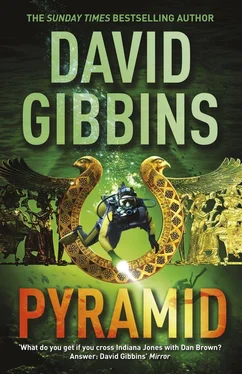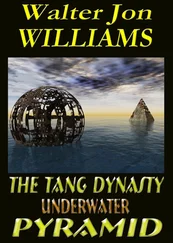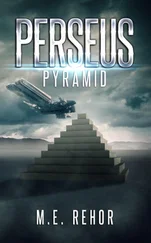Jack nodded. “He’s been developing that idea since looking at the foundation of organized religion in the early Neolithic, when religion became a tool of control for the first priest-kings. Go on.”
“Your discovery in the Gulf of Suez makes it absolutely certain that this event took place where the sea could have been parted only by a supernatural occurrence rather than, say, a marsh or a lake where the Israelites could have crossed some kind of shallow causeway that was then flooded.”
“That would be fine with most believers,” Costas said. “God through Moses caused the sea to be parted.”
“Sure. But let’s look at the hard evidence. That says to me that those chariots weren’t there because Moses parted the sea and they were swallowed up. They were there because someone ordered the charioteers to ride at full speed toward the cliff top, which then collapsed as they flew over it, causing them to be submerged in the sea and also to be buried in the resulting landslide.”
“That was our theory too,” Jack said. “We think the Israelite encampment was right on the edge of the cliff. Go on.”
“It’s about thinking laterally, Jack. Or I should say at right angles. If we assume that the Israelites could never have walked across the seafloor, then they must have gone along the edge. So instead of going east across the sea, they went north up the western shore. The biblical reference to the ‘wall unto them on their right hand, and on their left’ therefore means not walls of water within the sea, but the walls of the sea itself — that is, the western and eastern shores of the Gulf of Suez. Professor Dillen thinks the Greek allows for that. Now take a look at my CGI. I’ve exaggerated the height of the cliffs for effect, but you can see what I mean. And to cap it all, look at this.”
A close-up satellite image of a beach appeared on the screen. Costas peered at it. “I recognize those rocks. That’s where I had my lunch two days ago between dives.”
“Look closer. With the wide-brimmed hat, sitting with his feet dangling in the water. Almost as if he’s on holiday.”
Costas peered again. “You’ve got to be kidding me.”
“Yep,” Lanowski beamed. “I can follow your every move. If you won’t let me join in the fun, at least I can watch it and imagine myself there.”
“I thought the Egyptians had cut off Maurice’s access to their live-stream satellite imagery, as well as to every other foreign project in the country.”
“This isn’t through the institute. It’s Landsat, U.S. military. I’ve got a friend in the CIA who owes me a favor after I did the math in his PhD for him.”
“You’re a useful man to have around, Jacob,” Jack said.
“Glad you noticed.”
“The new translation makes sense. A lot of sense. Anything else?”
“Of course.” He dragged the mouse, and the image zoomed out. “Aysha told me about her discovery of the First World War diary that led you to that spot, the account of the crates of arms lost overboard, and that officer finding the ancient Egyptian sword. Well, she and I read through several previous entries in the diary last night. They showed that the British had developed a ruse in case they were spied on in the desert. Instead of driving the camels with the crates to a point on the cliff directly above the rendezvous point with the dhow, they off-loaded them several miles to the south and used a hidden track just below the cliff top known to local tribesmen to carry the crates out of view of the desert above. Captain Edmondson, the diarist, was also an archaeologist, and he mentioned how he thought the trackway was probably millennia old based on the number of rock slides and mud falls they had to negotiate on the way.”
“And then they came down to that beach where I had lunch,” Costas said. “Just above the spot where we found the rifles and ammunition underwater, and then the chariots.”
“Right. And just above that, the Landsat image shows a concavity in the line of the cliff where there’s a break in the path. I’m convinced that the concavity is evidence of the ancient cliff fall caused by the massed chariot charge, and I’m also convinced that Moses used that path to lead away the Israelites right under the noses of the Egyptians, leaving an empty encampment. The path continues for miles up the coast, so it would have been a viable escape route. What do you think, Jack? Bingo. Case closed.”
“Well, I’ll be damned,” Jack said, staring in fascination at the image. “I think you might just have earned your pay, Jacob.”
“I’m not the first one to have these ideas. You ever heard of Hiwi al-Bakhi?”
Jack was glued to the screen, but nodded. “His name means the Bactrian Heretic, a medieval Jewish dissenter from ancient Bactria, modern Afghanistan. He openly criticized the Hebrew Bible for lack of clarity and contradictions, and for representing God as inconsistent and capricious. His writing was another great discovery in the Cairo Geniza.”
“Well, he also tried to debunk the supernatural. For him, the parting of the Red Sea was a matter of the water ebbing and flowing, something he’s probably seen in the huge tidal flows on the shores of the Indian Ocean. He wasn’t to know that the Gulf of Suez doesn’t have much tide, nor does it have tidal flats like those he might have seen off India, but I like his way of thinking.”
“A rationalist like you, Jacob.”
“There’s something else that’s very interesting about Hiwi, Jack. Dillen and I talked about it too. His sect was so intent on cleansing Jewish religion and starting afresh that they wanted to change the Sabbath from Sunday to Wednesday, the day in Genesis when the sun was created. The sun , Jack. Does that ring any bells? We thought of Akhenaten and Moses together in the desert, and the revelation of the one god, the Aten. Akhenaten too was seeking a cleansing of the old religions, a return to a purer notion of deity, a rejection of gods who had become too anthropomorphic and displayed the human traits that Hiwi lamented in the God of the Bible. Maybe we should expect these periodic attempts at cleansing in the history of religion, but maybe too we should be looking for continuity, for a memory preserved even in Hiwi’s time of that foundation event in the desert almost two thousand years before. Egypt has had its takeovers — the Greeks, the Romans, the Muslims — and cultural destruction like the loss of the Alexandria library, but it never suffered the utter devastation of so many other regions, the sweeping away of its culture and people. And for the Jewish people, their history is all about maintenance of the tradition, isn’t it? That’s the biggest lesson of the Cairo Geniza, that it’s about continuity, not change.”
Jack nodded. “Even dissent like Hiwi’s became part of the Jewish intellectual tradition, one of debate rather than persecution, ensuring that inquiring minds were not stifled in the way they have been in so many other religions.”
Costas looked at Lanoswki. “I’d no idea you were also something of a rabbi, Jacob. A real multitasker.”
“ ‘Happy is the man who meditates on wisdom and occupies himself with understanding.’ That’s from Ben Ezra. My parents were Ukrainian Jews who were smuggled out of Europe just before the Second World War. All the rest of my family — my grandparents, my uncles and aunts — died in the Holocaust. Both my grandfathers had been rabbinical scholars, and my parents hoped that I’d follow the same route.”
“Is that how you got interested in Egyptology?” Jack asked.
Lanowski nodded. “I always wanted to know the specific identity of Pharaoh in the Bible. It annoyed me that he was unnamed, as if he’s the one and only pharaoh, but then I realized there was something special about him. Being part of your team in the quest for Akhenaten is fulfilling a childhood dream, Jack. I’m grateful to you.”
Читать дальше












